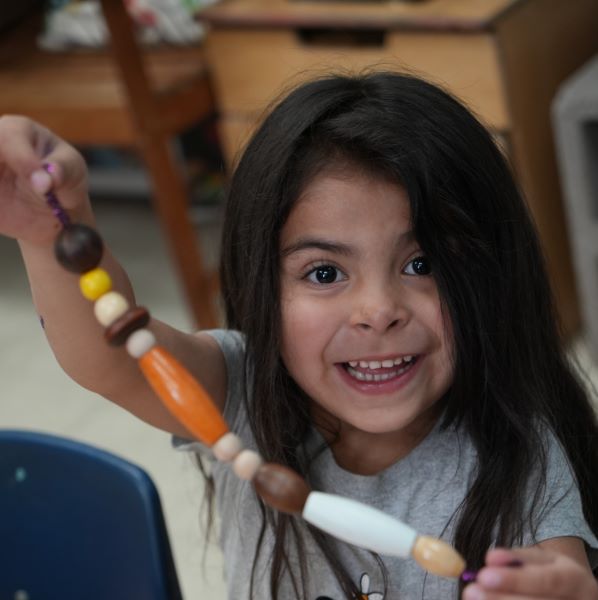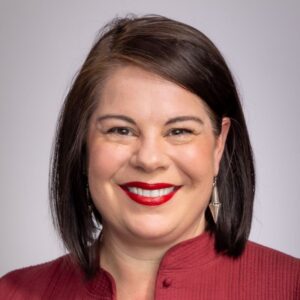The early childhood education workforce includes more than teachers. From mental health consultants to program directors, these professionals support children, and their families.
Working through federally funded programs, such as Early Intervention, these professionals provide services ranging in homes as well as education and care settings. It often requires intensive relationship management, and their work can take an emotional toll.
Teaching families and caregivers new strategies for relating to children requires sensitivity.
Active Listening
“Through ECHO, I learn strategies for asking questions, being curious about their child’s development, and then, through case studies, I learn how to take all of that information and reflect on it in a way that parents can use it,” says Kaydee Porras, an ECHO participant and developmental specialist with Las Cruces-based Aprendamos Family of Services. “We all come together because we do the same thing, but we have different approaches that we can learn from.”
Porras participates in the Reflective Practice in Early Care and Education New Mexico ECHO Program, which provides direct support, community, and education to New Mexico’s early childhood professionals. Together, they learn how to approach situations in a rigorous, reflective manner. And, in a profession with high levels of burnout, providers learn to practice neutrality toward their feelings, especially in difficult situations, such as suspected child abuse or volatile parental relationships.

Early childhood education leader Liz Martinez, LMSW, leads the New Mexico Reflective Practice in Early Care and Education ECHO Program as part of the Hub team. Photo Credit: Tara Memarian, Project ECHO, February 2024.
“When educators feel professionally connected, they are less likely to experience burnout,” says Soraya Gollop, Ph.D., director of the education initiatives at Project ECHO, citing research* across early childhood education. “We are seeing this connection through ECHO: our participants report a 77% reduction in professional isolation and 92% increase in professional connection**. Programs, like ECHO, that foster sustained professional connection and shared learning, are a powerful strategy for strengthening the education workforce and reducing burnout.“
Launched in 2022 with the New Mexico Early Childhood Education and Care Department, today, nearly 200 people have attended from 18 counties; and, four of five* participants reported an improvement in their professional practice as a result of the ECHO Program. In 2024, Project ECHO added a program*** that is conducted exclusively in Spanish, to facilitate discussions for providers who prefer to talk about their feelings in their native language.
Intentional Pauses
“Reflective practice emphasizes what we call ‘the consultative stance’ or the importance of breathing and making sure someone is ready for a recommendation before you provide it. It has helped me not react too quickly,” says Aurora Alvarez.
Alvarez works with the state’s Social Emotional and Early Development Initiative to decrease expulsion and suspensions in early childhood centers. Meeting with 18 educators weekly, in addition to classroom observation periods, the Reflective Practice ECHO has helped Alvarez pay attention to the issues at hand in an often-chaotic classroom.
Ultimately, the program aims to ensure that more early childhood professionals have the structure for reflective practice as well as a supportive community.
“The families we work with are so incredibly varied. It’s a lot to take in and pack up; it’s a lot to unload. The Reflective Practice ECHO gives us space to digest our experiences, and to make sure we all get to learn from more experiences than just our own,” says Mary Becker, director of Early Childhood Services for the nonprofit organization LifeROOTS. She has been working with children in Albuquerque since 1996, and has found the ECHO program so valuable, she has attended every program since its launch.
To learn more about the Reflective Practice in Early Care and Education New Mexico ECHO Program, email the program team.
We would like to thank the New Mexico Early Childhood Education and Care Department for funding this ECHO program; as well as the Hub team co-facilitators: Leandra Lomosad Anderson, LPCC, IMH-E III, Liz Martinez, LMSW, and Christina Riddle, and the Spanish-language ECHO program facilitator Olga Álvara.
*Supporting research citations:
- Collie, R. J. (2023). Teacher well-being, job demands, and resources: The role of relatedness with colleagues and school leadership. British Journal of Educational Psychology, 93(1), 1–18.
- Heilala, C., Kinnunen, U., Feldt, T., & Kallioniemi, A. (2024). Work demands, work resources, and turnover intentions among early childhood education and care professionals. Early Childhood Research Quarterly, 66, 12–24.
- Ingersoll, R. M., & Strong, M. (2011). The impact of induction and mentoring programs for beginning teachers: A critical review of the research. Review of Educational Research, 81(2), 201–233.
- Jeon, H. J., Buettner, C. K., & Snyder, A. R. (2022). Job demands, job resources, and burnout in early childhood special education teachers: The mediating role of sense of school community. Early Education and Development, 33(2), 265–281.
- Schaack, D. D., Le, V.-N., & Stedron, J. (2020). When fulfillment is not enough: Early childhood teacher occupational burnout and turnover intentions from a job demands and resources perspective. Early Education and Development, 31(7), 1011–1030.
- Zhao, X., Sun, J., Jeon, L., & Snyder, P. (2025). Early childhood educators’ well-being and turnover intentions in Head Start: Associations with workplace conditions. Journal of Research in Childhood Education, 39(1), 1–15.
**Survey results were generated from the Fall 2024 cohort. Email the Project ECHO data team for more information.
***Práctica Reflexiva en Atención Infantil Temprana y Educación New Mexico ECHO Program
Originally published in January 2025, this story was updated in January 2026 with the following: quote from Soraya Gollop, Ph.D.; research citations; survey results; Hub team member; authorship; new image of Liz Martinez.



